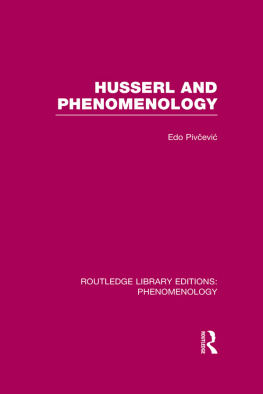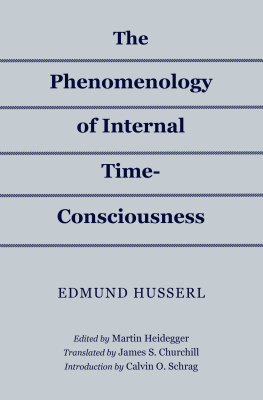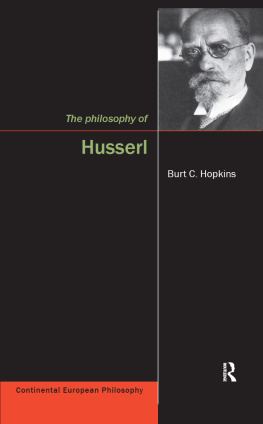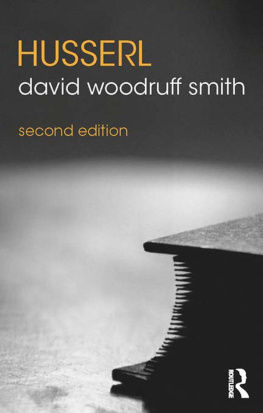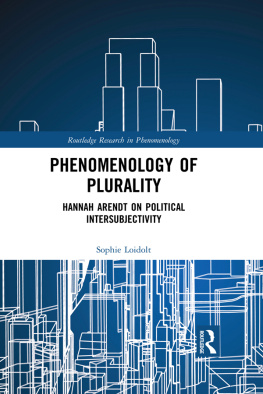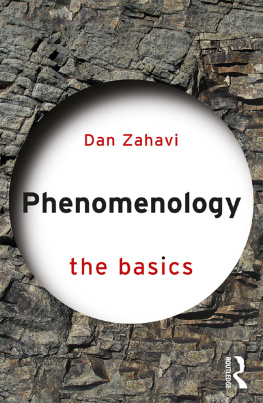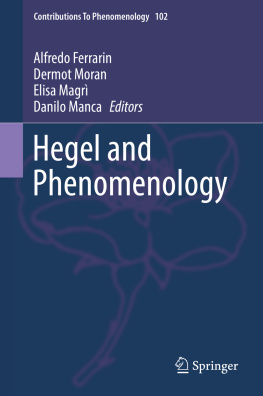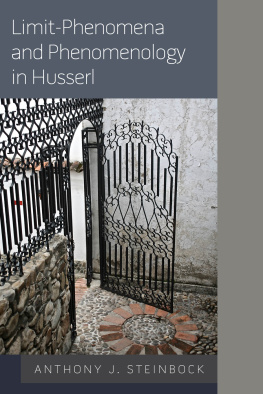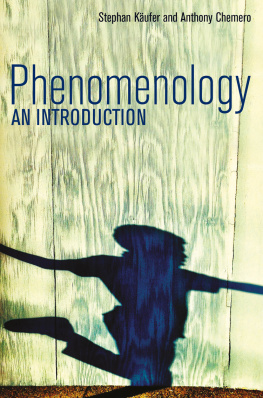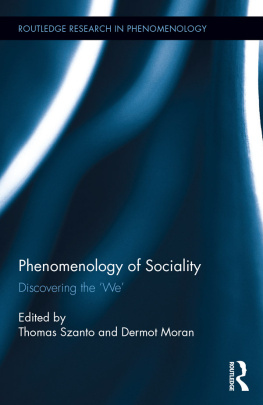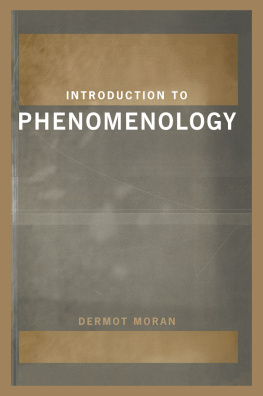The Golden Age of Phenomenology at the New School for Social Research, 19541973
SERIES IN CONTINENTAL THOUGHT
Editorial Board
Ted Toadvine, Chairman, University of Oregon
Michael Barber, Saint Louis University
Elizabeth A. Behnke, Study Project in Phenomenology of the Body
David Carr, Emory University
James Dodd, New School University
Lester Embree, Florida Atlantic University
Sara Heinmaa, University of Jyvskyl, University of Helsinki
Jos Huertas-Jourda, Wilfrid Laurier University
Joseph J. Kockelmans, Pennsylvania State University
William R. McKenna, Miami University
Algis Mickunas, Ohio University
J. N. Mohanty, Temple University
Dermot Moran, University College Dublin
Thomas Nenon, University of Memphis
Rosemary Rizo-Patron de Lerner, Pontificia Universidad Catlica del Per, Lima
Thomas M. Seebohm, Johannes Gutenberg Universitt, Mainz
Gail Soffer, Rome, Italy
Elizabeth Strker, Universitt Kln
Nicolas de Warren, Katholieke Universiteit Leuven
Richard M. Zaner, Vanderbilt University
International Advisory Board
Suzanne Bachelard, Universit de Paris
Rudolf Boehm, Rijksuniversiteit Gent
Albert Borgmann, University of Montana
Amedeo Giorgi, Saybrook Institute
Richard Grathoff, Universitt Bielefeld
Samuel Ijsseling, Husserl-Archief te Leuven
Alphonso Lingis, Pennsylvania State University
Werner Marx, Albert-Ludwigs Universitt, Freiburg
David Rasmussen, Boston College
John Sallis, Boston College
John Scanlon, Duquesne University
Hugh J. Silverman, State University of New York, Stony Brook
Carlo Sini, Universit di Milano
Jacques Taminiaux, Louvain-la-Neuve
D. Lawrence Wieder
Dallas Willard, University of Southern California
The Golden Age of Phenomenology at the New School for Social Research, 19541973
EDITED BY LESTER EMBREE AND MICHAEL D. BARBER
OHIO UNIVERSITY PRESS
ATHENS
Ohio University Press, Athens, Ohio 45701
ohioswallow.com
2017 by Ohio University Press
All rights reserved
To obtain permission to quote, reprint, or otherwise reproduce or distribute material from Ohio University Press publications, please contact our rights and permissions department at (740) 593-1154 or (740) 593-4536 (fax).
Printed in the United States of America
Ohio University Press books are printed on acid-free paper 
27 26 25 24 23 22 21 20 19 18 17 5 4 3 2 1
Hardcover ISBN 978-0-8214-2204-5
Library of Congress Cataloging-in-Publication Data available upon request.
To the memory of Maurice Natanson, New School phenomenology student, this volume is dedicated.
CONTENTS
Lester Embree
PREFACE
This volume is about the teaching and study of phenomenological philosophy in the Department of Philosophy of the Graduate Faculty of Political and Social Research at the New School for Social Research in New York City from 1954 to 1973. This was the first doctoral program with this emphasis and arguably played a major role in the introduction and defense of phenomenology into North America. Other important teachersfrom Karl Lwith to Rainer Shurmann, and especially Werner Marxwere there as well and influenced the students of this period. Nevertheless, and despite the fact that J. N. Mohanty and Thomas Seebohm were almost able to continue the tradition, this period was chiefly the time when first Alfred Schutz and Dorion Cairns and then, after Schutzs death in 1959, Cairns and Aron Gurwitsch taught how Edmund Husserls philosophy could be continued. I call these phenomenologists the New School Three. But there was also the influence of Maurice Natanson on other students, both before they came to the school and afterward, to such an extent that he almost counts as one of the teachers; for this reason this volume is dedicated to his memory.
What is distinctive about the New School Three is that, in addition to contributing some scholarship in the forms of interpretations and translations of Husserls works, their principal efforts were devoted toin Gurwitschs phraseadvancing the problems, which is to say that they focused on contributing originally to Husserls constitutive phenomenology. In addition, because these three not only shared a common source in the mature Husserl but also interacted with one another, they can be said to have formed a historical tendency. One can seriously ask whether theirs is not the only such tendency of original phenomenologizing in the United States to have developed. Practically all other phenomenologists in the United States are scholars who teach and write about phenomenology on the basis of literature that had been published in Europe. They rarely if ever engage in actual phenomenological investigation.
This project began as a conference of the same title at the Graduate Faculty of the New School in March 2007. A set of living New School students who had remained in contact with one another to various extents was invited to tell of their experiences of coming to and being at the school, and then to describe or provide a sample of their work since then. In addition, Michael Barber, Thomas Nenon, and George Psathas were invited to write on the deceased colleagues Alfred Schutz, Werner Marx, Maurice Natanson, and Helmut Wagner, whom they had as teachers and friends, while several of the New School students also wrote about their teachers.
I thank the original publishers for the following three reprinted texts: Aron Gurwitsch, On the Object of Thought: Methodological and Phenomenological Reflections, in The Phenomenology of the Noema, edited by Lester Embree and John Drummond (Dordrecht: Kluwer Academic Publishers, 1992), 927 (reprinted with kind permission of Springer Science+Business Media); Alfred Schutz, Positivistic Philosophy and the Actual Approach of Interpretive Social Science: An Ineditum of Alfred Schutz from Spring 1953, Husserl Studies 14, no. 2 (1998): 12349; and Werner Marx, The Need of PhilosophyAn Historical Reflexion, Universitas: A German Review of the Arts and Sciences 21, no. 4 (1979): 295303.
Furthermore, I thank Professor James Dodd of the New School and the Philosophy Department there for arranging the conference from which this volume has grown. Moreover, I thank my research assistants, Dr. Daniel Marcelle and Mr. Elliot Shaw, for help in ways too many to list. Finally, I thank the living teachers and the students for their efforts at documenting phenomenology at the New School in its golden age and some of its consequences while it can still be done.
Lester Embree
Delray Beach,
July 2014

Nicholas de Warren, Bina Gupta, J. N. Mohanty, Michael Barber, Jorge Garcia Gomez, Sara Garcia Gomez. Back row: James Dodd, Thomas Seebohm, Lester Embree, William McKenna, Osborne Wiggins, Thomas Nenon. Photo by Lester Embree.
INTRODUCTION
Lester Embree
More than two decades have passed since publication of the most recent book about the New School for Social Research. In previous books, the phenomenological philosophy taught in the Department of Philosophy of the Graduate Faculty of Political and Social Science during what can be called its golden age has, for various reasons, not been covered at all well. Most crucially, the longest-contributing teacher of phenomenological investigation there, Dorion Cairns, has hardly been mentioned. Furthermore, the subsequent efforts of the core group of students that developed have not been considered previously. This golden age and its immediate impact should not be forgotten.
Next page


